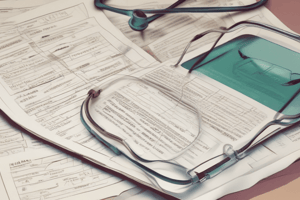Podcast
Questions and Answers
What is a common requirement for obtaining a pharmacist license across most states?
What is a common requirement for obtaining a pharmacist license across most states?
- Graduation from an accredited pharmacy school (correct)
- Completion of an undergraduate degree in biology
- Two years of professional experience in a pharmacy
- A personal reference from a licensed physician
What are the two main exams most state boards require passing for licensure?
What are the two main exams most state boards require passing for licensure?
- PCAT and NAPLEX
- MPJE and PANCE
- NAPLEX and MPJE (correct)
- CPJE and NAPLEX
What typically occurs after a pharmacy license has been issued by a state board?
What typically occurs after a pharmacy license has been issued by a state board?
- The pharmacy must periodically renew its license (correct)
- It remains indefinitely valid without renewal
- The pharmacy is exempt from self-reporting discipline
- The pharmacy must complete a state audit every year
Under what circumstance can a pharmacist's license be disciplined by one state based on actions in another state?
Under what circumstance can a pharmacist's license be disciplined by one state based on actions in another state?
Which of the following is NOT a potential ground for disciplinary action against a pharmacist?
Which of the following is NOT a potential ground for disciplinary action against a pharmacist?
What role does the Pharmacy Compounding Quality Act mostly address?
What role does the Pharmacy Compounding Quality Act mostly address?
How can state boards of pharmacy respond to disciplinary actions?
How can state boards of pharmacy respond to disciplinary actions?
What is a unique requirement for nonresident pharmacies operating in most states?
What is a unique requirement for nonresident pharmacies operating in most states?
What is the primary purpose of CPE Monitor in relation to pharmacists?
What is the primary purpose of CPE Monitor in relation to pharmacists?
Which of the following may be considered by state boards when determining unprofessional conduct?
Which of the following may be considered by state boards when determining unprofessional conduct?
What is the primary role of State Boards of Pharmacy regarding the practice of pharmacy?
What is the primary role of State Boards of Pharmacy regarding the practice of pharmacy?
Which of the following is considered a basis for disciplinary action in a pharmacy, even in the absence of a specific violation?
Which of the following is considered a basis for disciplinary action in a pharmacy, even in the absence of a specific violation?
Which of the following statements is true regarding the scope of practice for pharmacists?
Which of the following statements is true regarding the scope of practice for pharmacists?
What does self-regulation of the pharmacy profession primarily aim to achieve?
What does self-regulation of the pharmacy profession primarily aim to achieve?
Which action can be taken by State Boards of Pharmacy during disciplinary proceedings?
Which action can be taken by State Boards of Pharmacy during disciplinary proceedings?
Which of the following best describes the general continuing education requirements for pharmacists?
Which of the following best describes the general continuing education requirements for pharmacists?
Which term describes the legal regulations governing pharmacy practice and the actions taken to uphold these standards?
Which term describes the legal regulations governing pharmacy practice and the actions taken to uphold these standards?
What is one of the outcomes of state boards regulating pharmacy practice?
What is one of the outcomes of state boards regulating pharmacy practice?
What does a Collaborative Practice Agreement typically involve?
What does a Collaborative Practice Agreement typically involve?
What is the focus of disciplinary actions taken against pharmacists and pharmacies by state boards?
What is the focus of disciplinary actions taken against pharmacists and pharmacies by state boards?
Which of the following describes a primary objective of the Pharmacy Practice Act?
Which of the following describes a primary objective of the Pharmacy Practice Act?
Which of the following is NOT a typical requirement for licensure by a State Board of Pharmacy?
Which of the following is NOT a typical requirement for licensure by a State Board of Pharmacy?
What is the primary role of a pharmacist in charge (PIC) within a licensed pharmacy?
What is the primary role of a pharmacist in charge (PIC) within a licensed pharmacy?
Which grounds may lead to disciplinary action against a licensed pharmacist?
Which grounds may lead to disciplinary action against a licensed pharmacist?
Which of the following individuals typically composes a State Board of Pharmacy?
Which of the following individuals typically composes a State Board of Pharmacy?
What is one of the key functions of the National Association of Boards of Pharmacy (NABP)?
What is one of the key functions of the National Association of Boards of Pharmacy (NABP)?
What action can a State Board of Pharmacy take against a pharmacy license?
What action can a State Board of Pharmacy take against a pharmacy license?
What is one requirement concerning the designation of the pharmacist in charge (PIC)?
What is one requirement concerning the designation of the pharmacist in charge (PIC)?
Which of the following situations could potentially lead to a pharmacist's license being revoked?
Which of the following situations could potentially lead to a pharmacist's license being revoked?
Which area of practice does NOT typically fall under the jurisdiction of State Boards of Pharmacy?
Which area of practice does NOT typically fall under the jurisdiction of State Boards of Pharmacy?
What is required for pharmacists in all states regarding continuing education?
What is required for pharmacists in all states regarding continuing education?
Which of the following is true about the practice of pharmacy in many states?
Which of the following is true about the practice of pharmacy in many states?
What legislation affects both pharmacy and pharmacist licenses in terms of repercussions?
What legislation affects both pharmacy and pharmacist licenses in terms of repercussions?
Which of the following statements about prospective DUR is accurate?
Which of the following statements about prospective DUR is accurate?
What is one of the functions that pharmacy interns are allowed to perform?
What is one of the functions that pharmacy interns are allowed to perform?
What is a common requirement in various states for pharmacies regarding breaks for pharmacists?
What is a common requirement in various states for pharmacies regarding breaks for pharmacists?
Which statement is true regarding the assistance of pharmacy technicians?
Which statement is true regarding the assistance of pharmacy technicians?
How do state-specific laws impact the practice of pharmacy?
How do state-specific laws impact the practice of pharmacy?
What concern is raised in drug repository or take-back programs?
What concern is raised in drug repository or take-back programs?
Under what circumstance can certain medications be prescribed by pharmacists?
Under what circumstance can certain medications be prescribed by pharmacists?
Flashcards
Pharmacy regulation
Pharmacy regulation
Rules and laws that control the practice of pharmacy within a state.
Pharmacy practice act
Pharmacy practice act
State laws that determine pharmacy practice guidelines.
State Board of Pharmacy
State Board of Pharmacy
State agency that licenses pharmacists and pharmacies.
Licensure
Licensure
Signup and view all the flashcards
Unprofessional conduct
Unprofessional conduct
Signup and view all the flashcards
Disciplinary action
Disciplinary action
Signup and view all the flashcards
Expanded scope practice
Expanded scope practice
Signup and view all the flashcards
Collaborative Practice Agreements
Collaborative Practice Agreements
Signup and view all the flashcards
Limited prescriptive authority
Limited prescriptive authority
Signup and view all the flashcards
Continuing education
Continuing education
Signup and view all the flashcards
Pharmacy Licensure
Pharmacy Licensure
Signup and view all the flashcards
NAPLEX & MPJE
NAPLEX & MPJE
Signup and view all the flashcards
Pharmacist License Transfer
Pharmacist License Transfer
Signup and view all the flashcards
CPE
CPE
Signup and view all the flashcards
Pharmacy Licensing (Business)
Pharmacy Licensing (Business)
Signup and view all the flashcards
Nonresident Pharmacy Licensing
Nonresident Pharmacy Licensing
Signup and view all the flashcards
Pharmacy Discipline
Pharmacy Discipline
Signup and view all the flashcards
Disciplinary Grounds
Disciplinary Grounds
Signup and view all the flashcards
Self-Reporting of Discipline
Self-Reporting of Discipline
Signup and view all the flashcards
Reinstating a Revoked License
Reinstating a Revoked License
Signup and view all the flashcards
Pharmacist impairment laws
Pharmacist impairment laws
Signup and view all the flashcards
Pharmacy license penalties
Pharmacy license penalties
Signup and view all the flashcards
Pharmacy practice standards
Pharmacy practice standards
Signup and view all the flashcards
Pharmacy technician roles
Pharmacy technician roles
Signup and view all the flashcards
Pharmacy Technician Requirements
Pharmacy Technician Requirements
Signup and view all the flashcards
Pharmacist-on-duty requirements
Pharmacist-on-duty requirements
Signup and view all the flashcards
CPE Monitor
CPE Monitor
Signup and view all the flashcards
Pharmacist Prescribing
Pharmacist Prescribing
Signup and view all the flashcards
Prospective DUR
Prospective DUR
Signup and view all the flashcards
LEP Access to prescription information
LEP Access to prescription information
Signup and view all the flashcards
Pharmacy Practice Act
Pharmacy Practice Act
Signup and view all the flashcards
State Board of Pharmacy
State Board of Pharmacy
Signup and view all the flashcards
Pharmacist Licensure Objectives
Pharmacist Licensure Objectives
Signup and view all the flashcards
State Board of Pharmacy composition
State Board of Pharmacy composition
Signup and view all the flashcards
NABP's functions
NABP's functions
Signup and view all the flashcards
Licensure oversight
Licensure oversight
Signup and view all the flashcards
Pharmacist in Charge (PIC)
Pharmacist in Charge (PIC)
Signup and view all the flashcards
Licensure requirements
Licensure requirements
Signup and view all the flashcards
Disciplinary Action Grounds
Disciplinary Action Grounds
Signup and view all the flashcards
Disciplinary Action Process
Disciplinary Action Process
Signup and view all the flashcards
Study Notes
Overview
- Instructor: Dan Telford, PharmD
- Email: [email protected]
- Textbook: Pharmacy Practice and the Law, 10th Edition, Abood RR, Burns KA, Frankhauser F. (2025)
- Chapter: 7 State Regulation of Pharmacy Practice (pp. 321-341)
- Self-Regulation in Pharmacy
- Approaches to Regulation
- State Boards of Pharmacy
- Licensing
- Actions Against a License
- Actions Against a Pharmacy License
- Standards of Practice
- Repository or Take-Back Programs
- State Hospital Pharmacy Licensure Issues
- State Regulation of Long-Term Care Facilities
- Class Format: Application exercises to follow the tRAT
- Learning Objectives:
- Identify advantages and disadvantages of government regulation of professional practice
- Describe the purpose of a state board of pharmacy
- Recognize the functions of a state board of pharmacy
- Discuss grounds for disciplinary action against a licensed pharmacist
- Describe the process for disciplinary action against a licensed pharmacist
- Identify how states have specific practice standards for pharmacy and how those standards have expanded
- Describe state regulation of institutional pharmacy practice
- Additional Targeted Objectives (Focus Areas for RAT):
- Self-regulation (Pharmacy Practice Act, 3 objectives of pharmacist licensure)
- State Boards of Pharmacy
Additional Information
- Licensure:
- Requirements: Passing scores on NAPLEX and MPJE, graduating from pharmacy school, completing internships and being of good moral character.
- Transfer: Most states allow for license transfer between states under certain conditions.
- Renewal: Requires Continuing Pharmacy Education (CPE)
- Disciplinary Actions:
- Unprofessional Conduct: A catch-all term for disciplinary actions.
- Grounds: Providing false information, violating statutes, court convictions, moral turpitude, unprofessional conduct, and incompetence.
- Pharmacy Practice Acts: State laws regulating pharmacy practice
- State Boards:
- Oversee pharmacy licensure and discipline
- Oversee pharmacy operations
- Protect public health
- Standards of Practice:
- Defines pharmacy practice standards
- Ancillary Personnel:
- Regulation of pharmacy technicians and clerks
- Continuing education requirements
- Expanded scope of practice and state protocols
- Authorization
- Self-Regulation
- Self-governance continues at the state level
- Licensure helps to increase quality of care, reduce costs, and deter abuse
- Book Take-Away Points:
- Pharmacy profession began in the late 1800s
- Pharmacy is regulated through licensure
- State boards responsible for granting licenses
- Boards ensure competency and appropriate practice
- Take-Away Points:
- Drug regulation: States regulate drugs and take-back programs. Federal regulations vary.
- Hospital Pharmacy: Some states have specific laws for hospital pharmacy practice.
- Pharmacist Roles: Pharmacists have expanded roles in many states, including collaborating with other healthcare professionals and prescribing medications in some cases.
- Technology: Pharmacies are increasingly using technology such as electronic systems to monitor continuing education
- Licensure Process: To become licensed, candidates typically graduate from a pharmacy school and successfully complete an internship, and then pass licensure exams. CPE is required for license renewal
Studying That Suits You
Use AI to generate personalized quizzes and flashcards to suit your learning preferences.




